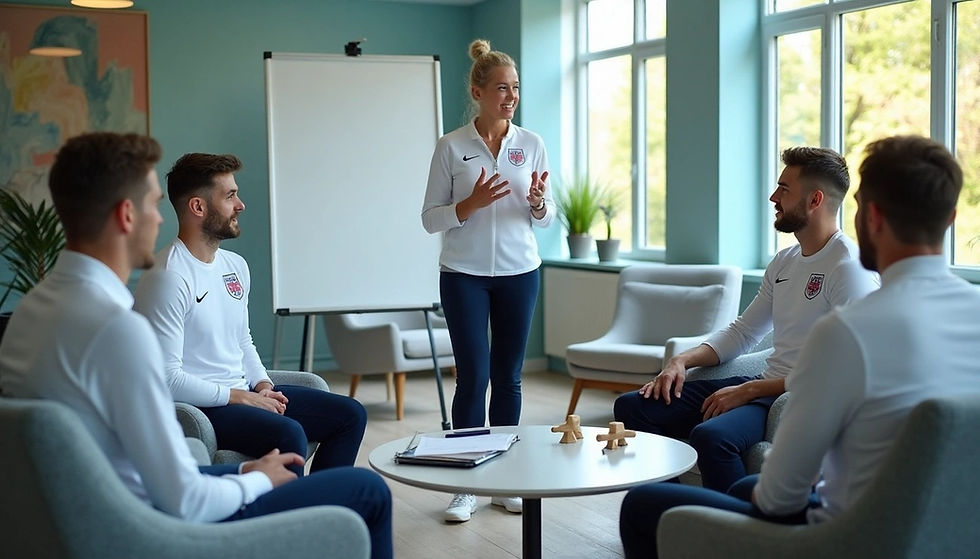The Role of a Sport Psychologist: Enhancing Athletic Performance Through Mental Training
- Dr Paul McCarthy

- Aug 7, 2025
- 5 min read
Introduction: Understanding the Mental Side of Sports
In the competitive world of athletics, physical training is only half the battle. The mental aspect of performance has gained recognition as equally crucial for success. Behind many elite athletes’ achievements stands a trained professional who specializes in the psychological aspects of sports performance. This blog explores the comprehensive role of sport psychologists in modern athletics.
The mental game in sports has evolved from a mere afterthought to a central component of athletic training. As pressure mounts on athletes to perform at increasingly higher levels, the demand for specialized psychological support has grown significantly.

What is a Sport Psychologist?
What is a sport psychologist (secondary keyword): Sport psychologists are specialized mental health professionals who apply psychological principles to enhance athletic performance, promote well-being, and assist athletes in achieving their goals. They bridge the gap between traditional psychology and sports science, creating a unique discipline focused on the mental aspects of athletic performance.
The sport psychologist definition (secondary keyword) encompasses professionals who have extensive training in both psychology and sports science. They understand the unique pressures and mental challenges that athletes face in competitive environments.
These professionals work with:
Individual athletes across all performance levels
Sports teams and organizations
Coaches and support staff
Parents of young athletes
Referees and officials
What Does a Sport Psychologist Do?
What does a sport psychologist do (secondary keyword)? Their work extends far beyond simple motivational talks. Sport psychologists employ evidence-based techniques to help athletes overcome mental barriers, enhance focus, and develop psychological skills that translate to improved performance.
A typical sport psychologist job description (secondary keyword) includes:
Performance Enhancement
Sport psychologists help athletes develop mental skills that complement their physical abilities. This includes:
Teaching visualization and imagery techniques
Developing pre-performance routines
Enhancing concentration and focus
Building confidence and self-belief
Setting effective goals
Managing competitive anxiety
“Sport psychologists help athletes develop mental skills for optimal performance, which can make the difference between good and exceptional results,” explains Dr. Karen Howells, a specialist who has worked extensively with rugby and football teams.
Mental Health Support
Beyond performance, sport psychologists address the overall psychological well-being of athletes. This includes:
Managing stress and burnout
Supporting through injury recovery
Addressing performance anxiety
Helping with transition periods (retirement, team changes)
Dealing with pressure from coaches, media, and fans
Team Dynamics
For team sports, sport psychologists work on:
Improving communication between team members
Enhancing team cohesion and chemistry
Resolving conflicts within teams
Developing leadership skills
Creating a positive team culture
How to Become a Sport Psychologist
How to become a sport psychologist (primary keyword) involves a structured educational path and professional certification. The journey typically requires:
Educational Requirements
Qualification Level | Requirement Details |
Undergraduate | Psychology degree (preferably with sports focus) |
Postgraduate | Master’s in Sport and Exercise Psychology |
Doctoral | Ph.D. or Psy.D. in Clinical or Counseling Psychology with sports specialization |
Professional Registration | Certification from relevant psychological associations |
The path requires dedication, with most practitioners spending 7-10 years in education and supervised practice before becoming fully qualified. “Learning how to become a sport psychologist typically involves obtaining a doctorate in psychology with specialization in sports, followed by supervised practical experience,” notes Dr. Steve Peters, who worked with the British Cycling team during their Olympic success.
Professional Certification
Most countries require sport psychologists to be licensed or certified by professional bodies such as:
American Psychological Association (Division 47)
Association for Applied Sport Psychology
British Psychological Society’s Division of Sport and Exercise Psychology

Sport Psychologist Jobs and Career Opportunities
Sport psychologist jobs (primary keyword) exist across various settings, offering diverse career paths for professionals in this field. Finding sport psychologist jobs requires understanding the various settings where these professionals work.
Common Employment Settings
Professional sports teams and organizations
Olympic training centers
University athletic departments
Private practice
Corporate wellness programs
Military and law enforcement
Youth sports programs
The demand for sport psychologist jobs has increased as more teams recognize the importance of mental performance. This growth reflects the mainstream acceptance of psychological training as essential for athletic success.
Sport Psychologist Salary and Compensation
When considering a sport psychologist salary (primary keyword), several factors come into play, including experience, setting, and client base. The average sport psychologist salary ranges from £60,000 to £100,000 depending on experience and setting.
Salary Ranges by Experience Level
Career Stage | Typical Annual Salary Range |
Entry Level | $40,000 - $60,000 |
Mid-Career | $60,000 - $80,000 |
Experienced | $80,000 - $100,000 |
Elite/Private Practice | $100,000+ |
Sport psychologist salary expectations should be balanced with the rewarding nature of the work. Those working with elite athletes or in private practice often earn significantly more than those in academic or research settings.
Impact and Effectiveness of Sport Psychology
The role of a sport psychologist extends beyond performance enhancement to supporting overall athlete well-being. Their work produces measurable results that justify their growing presence in sports.
Quantifiable Benefits
Research has demonstrated the effectiveness of sport psychology interventions:
20% increase in performance metrics through visualization techniques
85% of elite athletes report increased confidence after psychological intervention
15% average performance improvement through Psychological Skills Training (PST)
Evidence-Based Outcomes
Athletes working with sport psychologists consistently report:
Enhanced focus and concentration
Improved emotional regulation during competition
Better stress management under pressure
Increased mental resilience
More consistent performance
Real-World Applications and Case Studies
The practical application of sport psychology principles has led to remarkable success stories across various sports.
Specialized Interventions in Mental Training
Sport psychologists develop tailored approaches for different sports and situations:
Mental skills training programs for golfers to maintain focus
Team cohesion workshops for basketball and soccer teams
Individual performance enhancement sessions for track and field athletes
Stress management techniques for high-pressure competitions
Future Trends in Sport Psychology
The field of sport psychology continues to evolve with new approaches and technologies:
Emerging Areas
Integration of technology in psychological assessment and training
Virtual reality for simulation and mental preparation
Increased focus on cultural factors in sport psychology
Growing emphasis on mental health awareness and support
Expansion into new areas such as esports and extreme sports
Holistic Approaches
Modern sport psychologists are increasingly adopting integrated approaches that consider:
Sleep optimization
Nutrition’s impact on mental performance
Recovery strategies
Life balance and well-being outside of sport
Long-term athlete development
Conclusion: The Essential Role of Sport Psychologists in Modern Athletics
The sport psychologist definition has evolved significantly over the years, from a niche specialty to an essential component of athletic success. As sports continue to advance in competitiveness and complexity, the role of sport psychologists will only grow in importance.
For athletes seeking to maximize their potential, working with a sport psychologist offers a competitive edge that can make the difference between good and exceptional performance. For those interested in pursuing this career, the path of how to become a sport psychologist offers a challenging but rewarding journey into the fascinating intersection of mind and physical performance.
Whether you’re an athlete looking to improve your mental game, a coach seeking to enhance team performance, or someone considering a career in this field, understanding the comprehensive role of sport psychologists provides valuable insight into the psychological dimension of athletic excellence.
The typical sport psychologist job description reveals the diverse skills needed for success in this field, making it clear that these professionals contribute far more than just motivational support—they are architects of mental excellence in the demanding world of competitive sports.








